Should Bangladesh opt for a national government?

Post-revolution scenarios play out in diverse ways. Turmoil and instability follow revolutions, and political systems struggle to come to terms with new realities. Changes in 1947, 1971 and 1990 resulted in tension and turmoil, but a resilient Bangladesh eventually overcame the challenges.
In his poem "The Road Not Taken," Robert Frost highlighted the challenges and consequences of choice. He preferred the road "less travelled by" that made "all the difference." The July uprising in Bangladesh brought the country to a critical juncture of history, and it became the call of the interim government to decide which road to take. Guided by public demands, the student leaders' passion and the advisers' wisdom, holding the general elections and handing over the rein of government to the elected majority political party emerged as the preferred strategy for returning Bangladesh to normalcy.
The dominant pattern of thinking at present is that elections will restore a democratic government and establish an authority that would address the numerous challenges facing the country. After speculations and unclear statements from some advisers and demands from various groups to declare a schedule, the chief adviser informed the nation last month that elections would likely be held in late 2025 or the first half of 2026.
At this moment, society is divided into several ideological, political, social, and economic groups, and their views and expectations vary from one another. Policies of the past regime contributed to sharp divisions in society. It will take a long time to overcome the bitterness and animosity accumulated over decades and return to normal democratic practices. Elections will not be productive until those goals are achieved.
Degeneration and misuse of state institutions have diminished their capacity to organise and manage the task of holding national elections, not to mention the discharge of their constitutional responsibilities. Recent events of protests by groups aggrieved by the interim government's decisions suggest that there is much work to be done in promoting cohesiveness and harmony within the government machinery. There were reports of insubordination and breach of discipline in the police academy in Sarda, and members of the Ansar battalion put the secretariat under siege to press their demands. With serious dissatisfaction and resentment among key agencies that have a critical role to play, it will be difficult to hold free and fair elections.
Public trust and confidence in the electoral system and the role of the Election Commission have declined to dangerously low levels, and it will take time to restore them. The practice of seeking nominations from political parties for appointment in the Election Commission must be replaced with a transparent and inclusive arrangement in which public consultation can be incorporated. Since elections involve competition between candidates and political parties, they bear the risk of creating further divisions in society. This could affect the prospect of forging national unity that is needed for long-term productive results.
Decline in the law and order situation is a widespread problem in post-revolutionary societies. Most citizens of Bangladesh are concerned about that. The country lost the services of many personnel in the disciplinary services since the fall of the previous regime. These agencies are essential for assisting with holding elections and must be repopulated with new recruits.
The economy is under pressure as incalculable amounts of bank loans remain outstanding, foreign exchange reserves dwindle, and trade and business suffer. A massive capital flight took place through cronyism and corruption perpetrated over decades. The spiralling inflation has impacted crores of people who find it hard to survive. Steps by the interim government and the Trade Corporation of Bangladesh (TCB) to offer relief through the sale of essential commodities at "fair" prices is barely adequate compared to the citizens' need.
The government's financial strength is limited, and the costs of governance are on the rise. Elections are expensive undertakings and involve deployment of large numbers of government employees. This could divert attention from more urgent tasks confronting the government. Considering the possible drain on financial and human resources, this may not be the ideal time for the country to invest in electoral activities that may not produce sustainable results. Citizens may not be ready to participate in a democratic electoral process at this stage when many national questions remain unresolved.
Under the circumstances, the road not taken could be the option of establishing an inclusive national government that would give priority to stability, social justice, and democratic values. The July uprising forged an unprecedented unity in a divided society. It produced an opportunity to bring back depoliticised, alienated, and apathetic groups into the governing process. Focusing on elections at this time could lead to dividing a population that was unified in demanding termination of an autocratic regime.
Recent showings of hostility towards Bangladesh by certain quarters in India further underlines the importance of national unity.The chief adviser's consultations with political parties to build national unity and respond to the challenges opened an opportunity for all stakeholders to work together. A national government will add to the strength to plan and chart a course for the future political settlement in Bangladesh. It would serve the purpose of deliberating and finding answers to questions that fractured the society. Without a national consensus, a divided nation will continue to return to the same cycle of problems.
The process of healing and reconciliation in society requires regular dialogues and deliberations on important national questions. It requires an inclusive approach to listen to the voices of all stakeholders and build consensus on national issues. The projected time frame of 12-18 months for the election, suggested by the chief adviser, will still require an effective government, particularly for reassuring citizens that electoral arrangements are fair and impartial. At the same time, the interim government needs to gain the confidence of the public in their ability to ensure law and order and control the spiralling inflation. These are two issues with which most citizens are concerned. The March for National Unity on the first day of the new year resonated with chants for reform and justice, and these must be accomplished before the elections.
This task can be performed most effectively by a national government that represents all interests in society. Elections can be held after the national government tackles the critical problems that confront the country and that could make "all the difference" for ensuring a return for post-revolution Bangladesh to a parliamentary democratic republic, the ideal that guided the Liberation War.
Dr Ahmed Shafiqul Huque is professor in the Department of Political Science at McMaster University in Canada.
Views expressed in this article are the author's own.
Follow The Daily Star Opinion on Facebook for the latest opinions, commentaries and analyses by experts and professionals. To contribute your article or letter to The Daily Star Opinion, see our guidelines for submission.

 For all latest news, follow The Daily Star's Google News channel.
For all latest news, follow The Daily Star's Google News channel. 
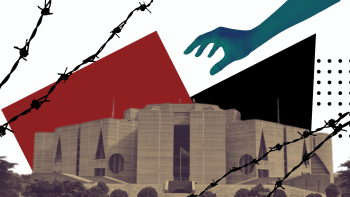



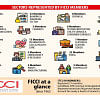
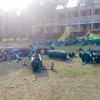
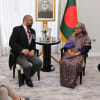

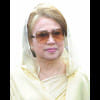


Comments